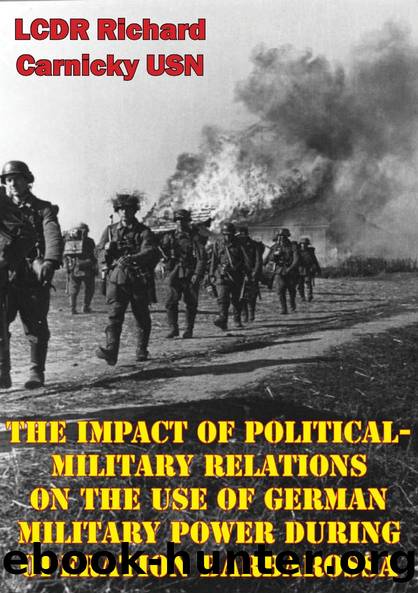The Impact Of Political-Military Relations On The Use Of German Military Power During Operation Barbarossa by LCDR Richard Carnicky USN

Author:LCDR Richard Carnicky USN [USN, LCDR Richard Carnicky]
Language: eng
Format: epub
Tags: Nonfiction, History, Germany, European General, Military, United States
ISBN: 9781786250315
Publisher: Verdun Press
Published: 2015-11-06T05:00:00+00:00
German War Theory from 1938 to 1941
After Beck retired in 1938 two significant events occurred. The first was the creation of the OKW during the same year. The second occurred later in December 1941 when Hitler relieved General Walther von Brauchitsch and assumed the post as Commander in Chief of the Army. With these two actions Hitler finally removed the last vestiges of the General Staff from the planning and military advisor process. Beckâs replacement, General Franz Halder as well as subsequent Chiefs of Staff, became curators of the General Staff with no real power to plan and execute campaigns. They did not have a significant impact on the German military organization or its operations on the eastern front after the failure of Barbarossa.
As Germany edged toward war with the Europe, Hitler became the dominant figure in military operations. Historians have suggested Hitlerâs motivation for war at the time was cleverly disguised by his ability to captivate and manipulate the German state. However, by examining his military decision making from 1933 onward in addition to his writings it is possible to identify Hitlerâs view on warfare.
His actions concerning foreign policy suggest he was comfortable using war in both limited and total forms. Some of his policies in the mid-1930s have already been addressed but examination of Germanyâs campaign against Western Europe provides further insight into his views. Certainly the occupation of France indicated Hitler had no objections to seeking acceptable peace terms. He did not displace French citizens and relocate them to gain lebensraum for the German people. His war against France was not an ideological one but one of foreign politics perpetrated in order to set the conditions for Germanyâs return to European significance. However, German occupation of Poland and the subsequent deportation of Polish Jews to concentration camps highlighted Hitlerâs more radical views.
The German invasion of Czechoslovakia, Poland, Belgium, and France highlighted the strengths of the Wehrmacht. Rapid envelopment of enemy forces using armored and motorized spearheads was the epitome of German operational doctrine. Schlieffenâs concept of the decisive battle against the west had worked. Despite fierce resistance the French, Czechs, Poles, and Belgians capitulated freeing Hitler to pursue a strategy against Britain and Russia.
However, Hitler viewed the Soviet Union differently than France and this had a major impact on the nature of war in the east. In Hitlerâs Mein Kampf he described his attitude toward Slavs. Three facets concerning Hitlerâs views not only demonstrated the possibility of hostilities between Germany and Russia, but also illustrated the savagery which would characterize the fight and dictate the nature of the conflict.
First Hitler characterized Bolshevism as an attempt by the Jews to dominate the World.
âGermany is today the next great war aim of Bolshevism. It requires all the force of a young missionary idea to raise our people up again, to free them from the snares of this international serpent, and to stop the inner contamination of our blood, in order that the forces of the nation thus set free
Download
This site does not store any files on its server. We only index and link to content provided by other sites. Please contact the content providers to delete copyright contents if any and email us, we'll remove relevant links or contents immediately.
| Central Asia | Southeast Asia |
| China | Hong Kong |
| India | Japan |
| Korea | Pakistan |
| Philippines | Russia |
The Sympathizer by Viet Thanh Nguyen(4093)
The Rape of Nanking by Iris Chang(4022)
World without end by Ken Follett(3341)
Ants Among Elephants by Sujatha Gidla(3279)
Blood and Sand by Alex Von Tunzelmann(3055)
Japanese Design by Patricia J. Graham(2998)
City of Djinns: a year in Delhi by William Dalrymple(2434)
Foreign Devils on the Silk Road: The Search for the Lost Treasures of Central Asia by Peter Hopkirk(2385)
Inglorious Empire by Shashi Tharoor(2345)
The Queen of Nothing by Holly Black(2313)
In Order to Live: A North Korean Girl's Journey to Freedom by Yeonmi Park(2301)
India's Ancient Past by R.S. Sharma(2293)
Tokyo by Rob Goss(2289)
India's biggest cover-up by Dhar Anuj(2242)
Tokyo Geek's Guide: Manga, Anime, Gaming, Cosplay, Toys, Idols & More - The Ultimate Guide to Japan's Otaku Culture by Simone Gianni(2239)
The Great Game: On Secret Service in High Asia by Peter Hopkirk(2228)
Goodbye Madame Butterfly(2162)
Batik by Rudolf Smend(2007)
Living Silence in Burma by Christina Fink(1977)
